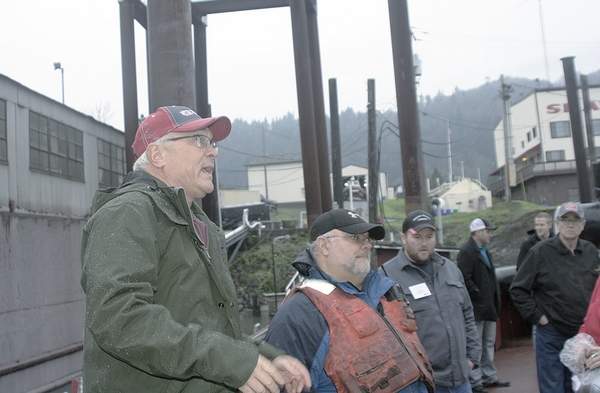forum
library
tutorial
contact

Company Adding Two New
Barges to Transport Wheat
by Matthew Weaver
Capital Press, December 7, 2017
|
the film forum library tutorial contact |

|
Company Adding Two New
by Matthew Weaver
|
Shaver Transportation will bring two new grain barges to Portland next year
to handle larger volumes of wheat moving on the Columbia and Snake rivers.
 PORTLAND -- One of the two companies that haul grain on the Columbia and Snake rivers will add two new barges to its fleet next year.
PORTLAND -- One of the two companies that haul grain on the Columbia and Snake rivers will add two new barges to its fleet next year.
That brings Shaver Transportation's total number of grain barges to 20, said Ken Ritter, vice president of the company's grain division.
In August, the company will tow the two 4,000-ton barges from Indiana down the Mississipi River system to the Gulf of Mexico, through the Panama Canal and up the West Coast to Portland. The cost of that operation is about 20 percent less than if the barges were built in Portland, said Rob Rich, vice president of marine services for Shaver.
The barges are 300 feet long and each carry 4,200 tons of wheat, or 140,000 bushels.
The company is adding the barges because a customer has more grain coming in, and in anticipation of a rail to barge transfer station at the Port of Morrow in Boardman, Ore.
"When that comes online, that will be a new source of wheat coming to the river from the Midwest transferring from rail to barge," Rich said. "It just makes sense to have equipment in place for not only the additional customer need, but the additional wheat coming to the river."
Unit trains of wheat normally destined for the Portland market will instead go to Boardman, where the wheat will be loaded onto barges.
Shaver's barges vary in size. The average tonnage is 3,400 tons, Rich said.
The company averages 110 tows a year, but this year it has had 125 to 130 tows in eight months. That's a record for the company, Ritter said, even though the river system was closed for lock maintenance until March.
Farmers send their grain from the field to grain elevators. Barges then bring the grain down the Columbia-Snake River system to one of seven export grain elevators, which ship the grain overseas.
Producers use trucking for short-haul shipping to Portland, or rail or barge for long-haul shipping.
Ritter said 13 barge lines used to operate on the river system. Today, only two remain, Shaver and Tidewater.
The two companies move 150 million bushels of wheat down the river system each year, Ritter said. Tidewater used to move 100 million and Shaver 50 million, but more recently Shaver has increased to 60 million and Tidewater down to 90 million, he said.
Tidewater has 63 barges, Rich said.
While the two companies are competitors, they work together occasionally, Rich said.
"The goal is to get the barged wheat down the river, not to create an issue for barged wheat to not get down the river," he said.
About 40 percent of wheat exported from the Columbia River Basin is moved by barge, with railroads hauling 60 percent.
Rich and Ritter spoke to a Washington Grain Commission wheat export tour Nov. 30.
Rich said the inland waterway system has continuing regional and national value.
"Barging transport and deep draft export opportunity for the Inland Northwest is an anchor of our economy," he said. "We appreciate being an integral part of that process, and we appreciate the commission taking the time to help educate (farmers) on the transport modes utilized in the movement of their product to market."
learn more on topics covered in the film
see the video
read the script
learn the songs
discussion forum
